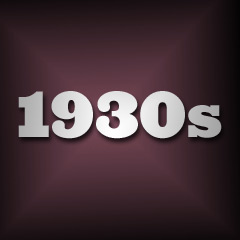
|
![]()
Greatest Films of the 1930s
1930 | 1931 | 1932 | 1933 | 1934 | 1935 | 1936 | 1937 | 1938 | 1939
Title Screen Film Genre(s), Title, Year, (Country), Length, Director, Description 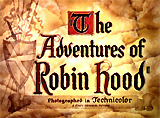


The Adventures of Robin Hood (1938), 106 minutes, D: Michael Curtiz, William Keighley
One of the best of Hollywood's swashbuckler adventure films, and one of star Errol Flynn's best portrayals. With many remakes too numerous to mention - and mostly inferior. This was the most expensive Warner Bros. film to date at $2 million, but it turned out to be the studio's biggest money-maker in 1939. It was the second of eight films to pair Errol Flynn and Olivia de Havilland. The legendary and infamous hero of Sherwood Forest Robin Hood/Sir Robin of Locksley (Errol Flynn), with his 'merrymen', who robs from the rich and gives to the poor. He woos Maid Marian (or Lady Marion Fitzwalter) (Olivia de Havilland) who rides Roy Rogers' future horse Trigger, and confronts his Norman adversaries: evil Prince John (Claude Rains) and his ruthless henchman Sir Guy of Gisbourne (Basil Rathbone), who attempt to take over England and oppress the Saxon masses during King Richard's (Ian Hunter) absence. With beautiful Technicolor sets, pageantry and costumes, dashing sword fighting, music by Oscar-winning Erich Wolfgang Korngold, lively characters, sparkling dialogue, and exciting action.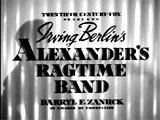


Alexander's Ragtime Band (1938), 105 minutes, D: Henry King
A nostalgic and lavish 20th Century Fox musical drama (and winner of Best Musical Score) set in the days of vaudeville on Broadway (from 1915-1938), an enjoyable backstage show-biz musical. The fictionalized film followed the career of Alexander/Roger Grant (Tyrone Power), a classical violinist who preferred playing popular ragtime music. He formed a small combo band, and during one gig in San Francisco's Nob Hill, paired up with young contralto singer Stella Kirby (Alice Fay, Fox's studio queen) who sang "Alexander's Ragtime Band" - and afterwards, the band was named Power "Alexander." There were ups and downs in the relationship between the quarreling Roger and Stella, as he intermittently fought for her love over a period of about 25 years and also contended in a love triangle with songwriter Charlie Dwyer (Don Ameche), a romantic rival for Stella. Powerful vocalist Jerry Allen (Ethel Merman) joined the group. This film included 28 Irving Berlin songs, such as "When That Midnight Choo-Choo Leaves for Alabam'," "Everybody's Doing It," "I'm Marching Along with Time," "My Walking Stick," "Heat Wave," and "Now It Can Be Told."

Algiers (1938), 95 minutes, D: John Cromwell
A romantic drama, a story of intrigue and romance. A remake of Pépé le Moko (1937, Fr.) with Jean Gabin, an inspiration for Casablanca (1942), and an inspiration for the musical remake Casbah (1948). [Note: Chuck Jones' and Warners' animated cartoon character "Pepe le Pew" was based on the "Pepe le Moko" character. "Come, let me take you to the Casbah," however, was never spoken in this film. In the cartoon The Cats Bah (1954), Pepe le Pew stated the line: "Come with me to the Casbah," reinforcing the idea that the line was spoken by Boyer in the film.] Crafty international jewel thief Pepe Le Moko (Charles Boyer, in his most famous role) fled to the notorious Casbah district (a safe hiding zone with dark twisting alleyways) in French Algiers to escape from pursuing North African police, led by Inspector Slimane (Joseph Calleia). There, he met and fell into a doomed romance with beautiful, bejewelled, sultry Parisian tourist Gaby (Hedy Lamarr in her American film debut) vacationing with her wealthy businessman fiancée Giraux (Robert Grieg). She was used to tempt Pepe out of the Casbah, where he was fatally shot at the dock.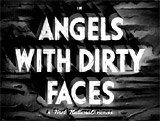


Angels With Dirty Faces (1938), 97 minutes, D: Michael Curtiz
A superb melodrama starring three greats - Cagney, O'Brien, and Bogart. Two kids from Brooklyn grew up together and followed very different paths in life, one becoming parish priest Father Jerry Connelly (William Tracey as youth, Pat O'Brien as adult), the other big-time, hardened gangster/convict Rocky Sullivan (Frankie Burke as youth, James Cagney as adult). Conflict arose when Rocky returnedd to the neighborhood and was idolized by a group of tough boys (future Dead End kids) who were led by the priest. After Rocky was captured and sentenced to death in the gas chamber after murdering local rivals, Father Jerry asked Rocky for a favor - to die like a coward and not appear as a hero to the boys. With an unforgettable movie moment - as an uncharacteristically-fearful Rocky was led to his execution.


The Baker's Wife (1938, Fr.) (aka La Femme du Boulanger), 133 minutes, D: Marcel Pagnol
A charming comedy/drama, adapted from Jean Giono's novel Jean Le Bleu. In a small Provencal town in the late 19th century, popular new (and rotund) baker Aimable Castanier (Raimu) was married to the beautiful and much younger Aurélie Castanier (Ginette Leclerc), and everyone loved his bread-making. When the unfaithful Aurélie soon ran off with a handsome shepherd named Dominique (Charles Moulin) for a romantic rendezvous, the distraught Aimable stopped baking, became suicidal, and started drinking heavily. The town's three leaders: the Marquis Castan de Venelles (Fernand Charpin), the Schoolteacher or L'Instituteur (Robert Bassac), and the Curate or Le Curé (Robert Vattier), planned to find Aurélie and return her to Aimable, so that they could reconcile their marriage and he could begin baking again.

Boys Town (1938), 96 minutes, D: Norman Taurog
MGM's esteemed, heart-warming portrayal of real-life, pious Father Edward Flanagan (Best Actor-winning Spencer Tracy with his second consecutive win) who developed the Boys Town project near Omaha Nebraska to bring orphans and juvenile delinquents from the inner city to an environment for a second chance where they could be educated and reformed. The greatest challenge to his noble belief that "There's no such thing as a bad boy" was from one of the new arrivals, tough kid, fast-talking, poolhall shark Whitey Marsh (Mickey Rooney), a loveable but difficult and disruptive bad boy delinquent, who ultimately was reformed by Flanagan's efforts in the melodramatic climax.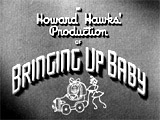



Bringing Up Baby (1938), 102 minutes, D: Howard Hawks
One of the greatest of Hollywood's and RKO Studios' fast-paced screwball comedies, by Howard Hawks, noted for the director's ability to helm any film genre. Loosely remade as What's Up, Doc (1972) starring Barbra Streisand and Ryan O'Neal. This was the second of four films pairing Cary Grant with Katharine Hepburn, and reportedly the first film with the word "gay" in the dialogue. Unbelievably, the film bombed at the box-office and as a result of the commercial failure, Hawks lost his RKO production contract, and Hepburn bought out her film contract (and continued to be labeled "box-office poison"). An absent-minded, mild-mannered, shy bespectacled paleontologist Professor David Huxley (Cary Grant) was in search of a missing dinosaur bone, stolen by a dog named George (Asta of The Thin Man series) owned by fast-talking, flighty, eccentric heiress Susan Vance (Katharine Hepburn), who also had a music-loving, pet leopard named Baby. Comic, chaotic situations arose when she set her sights on him and sent his life into turmoil because of her accident-prone nature. David was soliciting a $1 million dollar museum donation from wealthy, gift-giving philanthropist-sponsor Aunt Elizabeth (May Robson), Susan's aunt, and was unable to avoid Susan's meddling, eventually throwing them both in the local jail.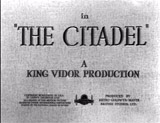


The Citadel (1938, UK), 110 minutes, D: King Vidor
A film adaptation from A. J. Cronin's best-selling novel. A poor, but idealistic, dedicated Scottish doctor Andrew Manson (Robert Donat) treated Welsh mining town miners who were infected with work-related TB, caused by silica dust in the anthracite mines. He dismissed his ideals and noble goals, however, when he began a more lucrative practice by treating aristocratic, rich London hypochondriacal patients instead, and cast aside his faithful, equally-idealistic schoolteacher wife Christine (Rosalind Russell) and his best friend Denny (Ralph Richardson). When his friend died (due to medical incompetence from high-priced surgeon Charles Every (Cecil Parker) after a car accident) and his wife convinced him to restore his true goals in life (and restore faith in himself), he reformed himself. Following an impassioned plea to the General Medical Council to save his career, he returned to minister to the people of the poor village.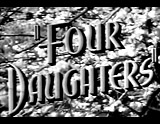


Four Daughters (1938), 90 minutes, D: Michael Curtiz
A tearjerker and soap-opera-ish romantic drama from a story by Fannie Hurst, with three real-life Lane sisters playing three of the four daughter roles. A music professor and widower Adam Lemp (Claude Rains), the Dean of the Briarwood Music Foundation, raised his four daughters: Thea (Lola Lane), Kay (Rosemary Lane), Emma (Gale Page), and the youngest Ann (Priscilla Lane) in a small town with the help of his sister - their elderly, no-nonsense Aunt Etta (May Robson). Romance-minded Emma was courted by boy-next-door neighbor florist Ernest Talbot (Dick Foran), while Thea wished to marry wealthy banker Ben Crowley (Frank McHugh), and Kay was busy with her singing career. The youngest, fun-loving Ann, vowed not to marry. Then, all four daughters became enamoured with boarder and pupil Felix Deitz (Jeffrey Lynn), a popular music conductor and composer, who chose to be engaged to Ann. On the eve of their wedding, realizing that Emma was really in love with Felix, Ann sacrificed her love and ran off with surly, tough, cynical, reckless and bitter musician Mickey Borden (John Garfield in his film debut). When poverty made their relationship difficult and he committed suicide, Ann returned home to be reunited with Felix.


Holiday (1938), 93 minutes, D: George Cukor
A film adaptation from a Broadway play written by Phillip Barry, about two marriages - one wrong and one right. Considered a New Years' Eve classic, and another romantic comedy wonderfully pairing Cary Grant and Katharine Hepburn, the third of four instances. In this year of 1938, both of their films flopped. A non-conformist, poor, free-spirited young man Johnny Case (Cary Grant) was pressured to please his rich socialite fiancee Julia Seton (Doris Nolan) and her stuffy privileged family and join her blueblood Park Avenue father Edward's (Henry Kolker) banking firm. He refused to conform to the family's rigid demands, and then realized that Julia's more free-thinking, eccentric sister Linda (Katharine Hepburn) was the only one who understood and loved him for his independent ways - and was a much better soul-mate and marital match. Linda's alcoholic and depressed brother Ned (Lew Ayres) was proof that it wasn't good to be a slave to earning money.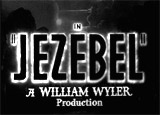

Jezebel (1938), 104 minutes, D: William Wyler
Bette Davis in a magnificent performance often compared to Gone With The Wind (1939) - offered to her as consolation by Warner Bros. because she was denied the role of Scarlett O'Hara. Davis won her second Best Actress Award for her performance. Headstrong, spoiled, self-centered Southern belle daughter Julie Morrison (Bette Davis) of a Southern aristocratic family in pre-Civil War New Orleans lost her fiancee Preston Dillard (Henry Fonda) when she stubbornly defied the convention of the day by wearing a scandalous red dress to the Olympus Ball. Embarrassed, he left and unbeknownst to her married Northerner Amy (Margaret Lindsay). When Preston returned three years later, she begged forgiveness but it was too late, and she suffered hurt and rejection, and felt she faced life alone. When an epidemic of yellow jack strikes, she begged Amy to accompany the mortally ill Preston to an island for quarantine and care for him.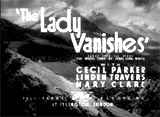




The Lady Vanishes (1938, UK), 97 minutes, D: Alfred Hitchcock
A highlight among Hitchcock's British films - an intriguing mystery story. Remade as The Lady Vanishes (1979) - a British comedy-mystery with Elliott Gould and Cybill Shepherd. Set just before WW II, young socialite Iris Henderson (Margaret Lockwood) was traveling on a train from Mandrika and moving through Europe to return to England (for her impending marriage). A charming elderly lady, English governess Miss Froy (Dame May Whitty), suddenly disappeared and it was discovered that no one was willing to believe or accept that the lady had disappeared or that she even existed. With the help of fellow passenger-musicologist Gilbert Redman (Michael Redgrave in his film debut), Iris sought to locate Miss Froy. A suspenseful film, when Iris and Gilbert were pulled into the beguiling and strange incident - with the only proof being her name written in fog/frost on the train window. Iris' memory and veracity were questioned, since she was hit over the head with a flowerpot while boarding the train, suffered a concussion, and might be delusional. During the quest for Miss Froy (who was eventually discovered alive and safe) there was thought of a sinister, mysterious conspiracy to kidnap her. Her disappearance was linked to an espionage plot, and she was ultimately identified as a British spy who had memorized a musical tune (with a secret encoded message) desired by the enemy - Hitchcock's trademark "MacGuffin." Miss Froy had first heard the tune being sung by a Tyrolean street folk singer outside of her hotel just before he was strangled, and she was to deliver the message to the Foreign Office in Whitehall.


Olympia (1938, Germ.), 118 and 107 minutes (in two parts: Festival of the Nations, and Festival of Beauty, aka Olympia 1. Teil: Fest der Volker, and Olympia 2. Teil: Fest der Schonheit), D: Leni Riefenstahl
Innovative German film-maker Leni Riefenstahl documented the 1936 Berlin Olympics (famous for American track star Jesse Owens who won four gold medals for his sprint racing) in this stunning film - with graceful and beautiful images of 'Aryan' athletes in competition. The film's innovations directly influenced future televised sports coverage. It opened with a beautiful, silent prologue sequence with views of ancient nude Greek statues (that seemingly came to life), nude dancers, and near-nude male athletes. The images artistically captured the movement of beautiful human bodies to perfection.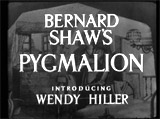



Pygmalion (1938, UK), 96 minutes, D: Anthony Asquith, Leslie Howard
A delightful romantic comedy, the first (non-musical) film version of George Bernard Shaw's 1912 stage play and screenplay, and a Broadway opening in 1914. It was a socio-economic drama based on the Cinderella story, but actually taken from the Greek myth of Pygmalion - about a sculptor who fell in love with a marble statue of his own making. A bullying, stuffy and smug bachelor, Professor Henry Higgins (Leslie Howard) - a teacher of phonetics and linguistics, made a bet with his friend Colonel George Pickering (Scott Sunderland) that he could educate and transform a common, coarse and impetuous Cockney 'guttersnipe' flower seller from Convent Garden, Eliza Doolittle (Wendy Hiller in her first screen role) into being able to speak in proper English and pass as a captivating British lady/duchess of upper class breeding - within six months - at the Ambassador's Ball. To do so, he must transform her thick-accented voice, by coaching her to speak proper English with elocution lessons, teaching her manners, and drilling her so that she will be educated. "We were above that in Convent Garden...I sold flowers. I didn't sell myself. Now you've made a lady of me; I'm not fit to sell anything else." "I'm a good girl, I am." At a tea party, in her first public testing, she blurted out, "Not bloody likely." However, she made a spectacular debut at the Ambassador's reception, proving him right. In the process of teaching her, Higgins fell in love with her, although she was attracted by an upper class gentleman named Freddy Eynsford-Hill (David Tree), and found she could not return home to Higgins. The Broadway musical remake that was inspired from this film, Lerner and Loewe's 1956 production, also led to the famous film musical My Fair Lady (1962), that would walk away with eight Oscars (out of twelve), including Best Picture. It was honored with four Academy Award nominations including Best Picture, Best Actor (Howard), and Best Actress (Hiller), and one Oscar for Best Screenplay.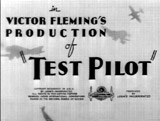

Test Pilot (1938), 118 minutes, D: Victor Fleming
An exciting aviation drama with stunningly-photographed aerial sequences, and one of MGM's greatest hits of the year. The story of an adventurous, daredevil test pilot Jim Lane (Clark Gable) who tested planes manufactured by Howard Drake (Lionel Barrymore), aided by loyal mechanic Gunner Sloane (Spencer Tracy). When testing a plane and forced to land in a Kansas cornfield, he met and fell in love with farm girl Ann Barton (Myrna Loy), and they married. Lane was a brilliant test pilot but unpredictable and uneasy about settling down into domestic life as a husband and father. He obviously enjoyed the risks of his profession, which made it difficult for his wife to sit and watch him testing a new Air Force bomber.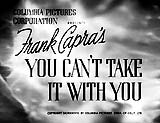

You Can't Take It With You (1938), 126 minutes, D: Frank Capra
A great, endearing Best Picture-winning screwball comedy directed by Frank Capra from the Pulitzer Prize-winning play from Moss Hart and George S. Kaufman. Receptionist/secretary Alice Sycamore (Jean Arthur) was the beautiful and sane daughter of an eccentric and happy family, run by philosophical patriarch/grandfather Martin Vanderhof (Lionel Barrymore). Family members were involved in free-wheeling activities including painting and sculpture, ballet dancing, fireworks invention and experimentation, xylophone playing, mystery writing and more. Alice worked in the offices of capitalist Anthony P. Kirby (Edward Arnold), a rich conservative banker. She feared that she might never marry, due to her crazy family. However, she became engaged to Kirby's son Tony Kirby (James Stewart), a down-to-earth son. Problems erupted when the two incompatible families were to meet for dinner at the Sycamore's house before the wedding. The Kirbys mistakenly arrived one day early, fireworks were accidently set off, everyone was carted off to jail, and the relationship between Tony and Alice was quickly put in serious jeopardy - would their love win out?